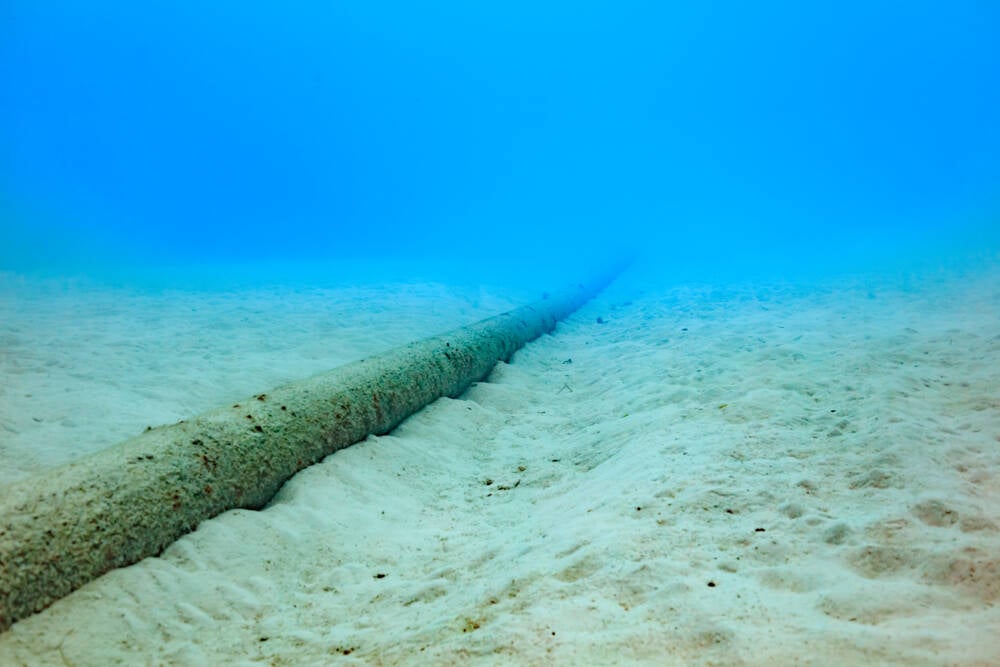Chinese Ship Casts Shadow Over Baltic Subsea Cable Snipfest

The Danish military has confirmed it is tracking a Chinese ship that is under investigation after two optical fiber internet cables under the Baltic Sea were damaged.
The cables are widely believed to have been deliberately interfered with, a situation German Defense Minister Boris Pistorius insists was "sabotage."
The two cables run between Finland and Germany and between Lithuania and Sweden respectively. They are part of the circa 600 undersea cables – or shall we say, 600 that are publicly known about and tracked.
Pistorius told local papers this week: "Nobody believes that these cables were accidentally severed."
In a post on X, the Danish armed forces only confirmed it is now "present in the area near the Chinese ship Yi Peng 3" and offered no further comments.
Swedish police confirmed to media that it is investigating the incident and said the Chinese ship in the Baltic sea off the coast of Denmark was "of interest." It later added that there might be other vessels of interest to Sweden's investigation.
Marine traffic data confirms Yi Peng 3 was in the area at the time, although this is not confirmation the ship is necessarily the culprit. For its part, China has denied involvement in the undersea cable damage.
The Sky News Data & Forensics unit analyzed marine tracking data that shows the Chinese ship Yi Peng 3 left the Russian port of Ust-Luga on November 15. It passed close to both internet cables around the time each was damaged on Sunday and Monday.
The Danish Navy has been following the Chinese-flagged carrier since Monday evening using at least five different patrol ships as it traveled through Denmark's waters, according to data from MarineTraffic.
The Yi Peng 3 has stopped in the Kattegat Sea area and is currently anchored with a Danish Navy ship nearby.
According to the Financial Times, China's embassy in Stockholm did not have information on the issue.
- Europe glances Russia's way after Baltic Sea data cables severed
- Hyperscalers are carving up the ocean floor into private internet highways
- Russia's top-secret military unit reportedly plots undersea cable 'sabotage'
- Vietnam's internet again in trouble as three of five submarine cables go down
Earlier this week, multiple reports confirmed that the C-Lion1 cable between the Finnish capital of Helsinki and Rostock on Germany's Baltic coast started to malfunction at about 0400 UTC on Monday. Separately, a 218 km internet link between Lithuania and Sweden's Gotland Island also lost service on Sunday morning. The latter cable was the BCS East-West Interlink submarine cable connecting Sventoji, Lithuania and Katthammarsvik, Sweden, which actually nearly overlaps C-Lion1 at one spot in the Baltic.
C-Lion1, launched in 2016, runs 1,173 km between Finland and Germany connecting central European telecommunications networks to the Nordics.
Work to repair the cable was set to begin shortly after this article was published, operator Cinia said on its website: "According to current information, the repair vessel Cable Vigilance will leave Calais, France, on Thursday 21 November at 7 pm (EET) and is expected to start repair work on Monday at the latest, depending on weather conditions. Estimated completion of the cable repair is by the end of November."
In a joint statement, the Finnish and German foreign ministers said they were "deeply concerned" about the severed cable beneath the Baltic Sea connecting the two nations.
"The fact that such an incident immediately raises suspicions of intentional damage speaks volumes about the volatility of our times. A thorough investigation is underway. Our European security is not only under threat from Russia's war of aggression against Ukraine, but also from hybrid warfare by malicious actors. Safeguarding our shared critical infrastructure is vital to our security and the resilience of our societies."
As for how resilient they are, that would be very resilient indeed. Cloudflare last night published graphs showing "no apparent impact" to traffic volumes in either country at the time that the cables were damaged – a situation it ascribed to the "significant redundancy and resilience of internet infrastructure in Europe."
Meanwhile, in the US, the Federal Communications Commission is expected (PDF) to push through a proposal looking at national security standards and oversight of the undersea internet cable systems through which nearly all of the world's internet traffic must flow. ®
From Chip War To Cloud War: The Next Frontier In Global Tech Competition
The global chip war, characterized by intense competition among nations and corporations for supremacy in semiconductor ... Read more
The High Stakes Of Tech Regulation: Security Risks And Market Dynamics
The influence of tech giants in the global economy continues to grow, raising crucial questions about how to balance sec... Read more
The Tyranny Of Instagram Interiors: Why It's Time To Break Free From Algorithm-Driven Aesthetics
Instagram has become a dominant force in shaping interior design trends, offering a seemingly endless stream of inspirat... Read more
The Data Crunch In AI: Strategies For Sustainability
Exploring solutions to the imminent exhaustion of internet data for AI training.As the artificial intelligence (AI) indu... Read more
Google Abandons Four-Year Effort To Remove Cookies From Chrome Browser
After four years of dedicated effort, Google has decided to abandon its plan to remove third-party cookies from its Chro... Read more
LinkedIn Embraces AI And Gamification To Drive User Engagement And Revenue
In an effort to tackle slowing revenue growth and enhance user engagement, LinkedIn is turning to artificial intelligenc... Read more

